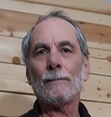Ed Teja's Blog, page 4
August 11, 2017
A North Korean love song from the vaults of the mindfields
A friend of mine, and cowriter of some songs, just posted this song.
[image error]
The Mist of Uijeongbu (Suki Lee) by Harper JohnUnique Korean war spy love songSOUNDCLICK.COM
Published on August 11, 2017 08:41
August 10, 2017
Emerging Stories
So I'm slowly evolving the first trio of new stories that take place in the same universe that I introduced in THE LEGEND OF RON ANEJO. These aren't stories about Ron, but the place... the fictional island of Kayakoo, which is incredibly loosely based on Carriacou, Grenada, which is about my most favorite island in the world. (Doesn't everyone have a list of favorite islands?) The stories are semi-cozy mysteries, featuring a local policeman named Johnny Cliff... although the people he grew up among know him as Specs.
I'll be doing a launch when all three are done are releasing them quickly. Then, if you like them, there will be a lot more Kayakoo Mysteries.
As an aside, my friend sailing buddy David Goldhill, who runs Bayaleau Cottages there (on Carriacou, not Kayakoo. The last time I checked, he wasn't fictional) sent me a photo of one of my favorite tourist destinations on the island... a portable rum shop. I decided I'd post the picture as I think it characterizes the charm (and enterprise) of the island. Enjoy. And if you go there, be sure to try the Jack Iron.
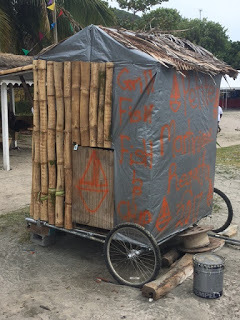
I'll be doing a launch when all three are done are releasing them quickly. Then, if you like them, there will be a lot more Kayakoo Mysteries.
As an aside, my friend sailing buddy David Goldhill, who runs Bayaleau Cottages there (on Carriacou, not Kayakoo. The last time I checked, he wasn't fictional) sent me a photo of one of my favorite tourist destinations on the island... a portable rum shop. I decided I'd post the picture as I think it characterizes the charm (and enterprise) of the island. Enjoy. And if you go there, be sure to try the Jack Iron.

Published on August 10, 2017 07:57
August 7, 2017
Confessions of a Jade Lord
Alat Asem’s Novel “Confessions of a Jade Lord” (时间悄悄的嘴脸)

Bruce Humes and I worked together back at Asian Sources in Hong Kong. We worked in different departments but often had lunch together, escaping the company cafeteria in favor of some local restaurant, usually in Aberdeen (Little Hong Kong) where his fluency in Cantonese came in handy. He also was fluent in Mandarin, which meant he did a lot of work for the company in Mainland China over the years.
We both left Hong Kong and full-time trade press work, but fortunately have stayed in touch. These days he does Chinese-to-English literary translations from a variety of locations around Asia (with a short period studying in Turkey). He recently translated a novel by a bilingual Uyghur author, named Alat Asem. It's a curious work, oddly reminiscent in my strange mind of some work by contemporary Japanese novelist, at least stylistically.
You can read an excerpt of the book at http://bruce-humes.com/archives/11723 and make your own decision.

Bruce Humes and I worked together back at Asian Sources in Hong Kong. We worked in different departments but often had lunch together, escaping the company cafeteria in favor of some local restaurant, usually in Aberdeen (Little Hong Kong) where his fluency in Cantonese came in handy. He also was fluent in Mandarin, which meant he did a lot of work for the company in Mainland China over the years.
We both left Hong Kong and full-time trade press work, but fortunately have stayed in touch. These days he does Chinese-to-English literary translations from a variety of locations around Asia (with a short period studying in Turkey). He recently translated a novel by a bilingual Uyghur author, named Alat Asem. It's a curious work, oddly reminiscent in my strange mind of some work by contemporary Japanese novelist, at least stylistically.
You can read an excerpt of the book at http://bruce-humes.com/archives/11723 and make your own decision.
Published on August 07, 2017 06:35
July 27, 2017
A Superstitious Man
I recently collected some of my songs that related to my travels in the Caribbean together and I've released them as a digital album. Sailors are superstitious people and superstitions and other mores fascinate me, so the album is called A Superstitious Man.
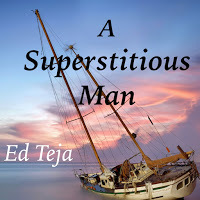
It's available through CD Baby, and the songs are available singly on iTunes. They are mostly about travel and the people I've met. Sometimes the connections are obscure, but sometimes even I find my logic impenetrable.
All this came together as I'm working on a new series of books... Kayakoo Mysteries. They are going well and they'll involve a lighthearted look (the only kind I'm really good at) at life and crime in the islands with an emphasis on life.
And I have a request. One song on this CD, called Pilot Light, has special meaning to me. If you love it or hate it, I'd appreciate hearing it either way. It's a bit off kilter, in the scheme of things, which means it is suggesting new directions for me that are attractive. You can contact me through comments on this page or Google+. Go ahead and connect!

It's available through CD Baby, and the songs are available singly on iTunes. They are mostly about travel and the people I've met. Sometimes the connections are obscure, but sometimes even I find my logic impenetrable.
All this came together as I'm working on a new series of books... Kayakoo Mysteries. They are going well and they'll involve a lighthearted look (the only kind I'm really good at) at life and crime in the islands with an emphasis on life.
And I have a request. One song on this CD, called Pilot Light, has special meaning to me. If you love it or hate it, I'd appreciate hearing it either way. It's a bit off kilter, in the scheme of things, which means it is suggesting new directions for me that are attractive. You can contact me through comments on this page or Google+. Go ahead and connect!
Published on July 27, 2017 07:12
April 21, 2017
Back to Carriacou
When I wrote THE LEGEND OF RON ANEJO, I based the story on the fictional island of Kayakoo in the Caribbean. Well, as everyone who lives there, and most people who know me know, Kayakoo is a highly fictionalized version of Carriacou, where I spent most of two years living on a boat. I also wrote the short story THE RUM SHOP in an attempt to capture a sense of life on that lovely island.
I used Grenada itself as a location in the story DEATH BENEFITS too. Why? Because I like the place.
I haven't been back in a lot of years, far too many, but stay in touch with some people in the area. And now I'm working on some more Caribbean stories and it's on my mind.
Then, today I got an email about the movie Vanishing Sail. I don't normally mention commercial products, but this movie is about boatbuilding, Carriacou, and an amazing boatbuilder named Alwyn Enoe. We had the good fortune to work with him on our boat--he did the hard stuff. He not only did some hull patches on our old wooden boat, but replaced a deck beam with a single piece of purple heart. We went to the launch of a fishing boat he built too. It was a grand experience. Watching him work, mostly with an adz was amazing.
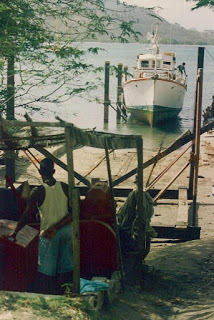 Captain Ed hauling out in Carriacou
Captain Ed hauling out in Carriacou
I've been dying to see the movie and now that the DVD is on sale, I'm putting in my order.
Given that I'm finding my mind drifting back to that time and place and knowing it will be a while before I can return and see Alwyn again, at least I can see the video. If you love old sailboats and the islands, get a copy.
I used Grenada itself as a location in the story DEATH BENEFITS too. Why? Because I like the place.
I haven't been back in a lot of years, far too many, but stay in touch with some people in the area. And now I'm working on some more Caribbean stories and it's on my mind.
Then, today I got an email about the movie Vanishing Sail. I don't normally mention commercial products, but this movie is about boatbuilding, Carriacou, and an amazing boatbuilder named Alwyn Enoe. We had the good fortune to work with him on our boat--he did the hard stuff. He not only did some hull patches on our old wooden boat, but replaced a deck beam with a single piece of purple heart. We went to the launch of a fishing boat he built too. It was a grand experience. Watching him work, mostly with an adz was amazing.
 Captain Ed hauling out in Carriacou
Captain Ed hauling out in CarriacouI've been dying to see the movie and now that the DVD is on sale, I'm putting in my order.
Given that I'm finding my mind drifting back to that time and place and knowing it will be a while before I can return and see Alwyn again, at least I can see the video. If you love old sailboats and the islands, get a copy.
Published on April 21, 2017 07:34
April 4, 2017
Roper Lake State Park
We needed to go to Safford Arizona to get our van, Moby, serviced as they are the nearest Nissan dealer. It's only two hours but we decided to make the trip fun. We'd go the Sunday before and camp at Roper Lake State Park, which is a few minutes south of Safford.
As it turned out, the road to Roper Lake is right where the Nissan dealer is. That was a nice bonus, but things would've been great anyway.
We got there around two in the afternoon, having stopped in Safford to check out Home Depot. (Dagny found a great deal on a set of drill bits.) We use the nonelectric campground and got #46, right on the lake.
If you look close at the picture, there is a heron on the beach!
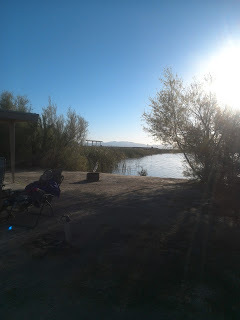
The cheap campsites are $20, which is expensive compared to what we usually pay, but a deal compared with staying at a motel. The campground is excellent, with nice hosts, and although there is some road noise, very nice.

We had a nice dinner, cooked in the van, and breakfast in the morning, and leisurely wandered to the dealer Monday morning, got the van serviced (nice people) and then drove home.
As it turned out, the road to Roper Lake is right where the Nissan dealer is. That was a nice bonus, but things would've been great anyway.
We got there around two in the afternoon, having stopped in Safford to check out Home Depot. (Dagny found a great deal on a set of drill bits.) We use the nonelectric campground and got #46, right on the lake.
If you look close at the picture, there is a heron on the beach!

The cheap campsites are $20, which is expensive compared to what we usually pay, but a deal compared with staying at a motel. The campground is excellent, with nice hosts, and although there is some road noise, very nice.

We had a nice dinner, cooked in the van, and breakfast in the morning, and leisurely wandered to the dealer Monday morning, got the van serviced (nice people) and then drove home.
Published on April 04, 2017 11:38
March 20, 2017
Understanding the experience
I've been writing a report on my trip to Ecuador. I spent most of February traveling around, exploring, looking at the place, first with my younger brother Dan, then alone. So far I've written about the first half, but I stopped. As written it's a factual, chronological tale. A travelogue. What I wanted was a personal account. I want to capture the sensations, and explore my own reactions to the place, both good and bad. This draft hasn't come close to doing that.
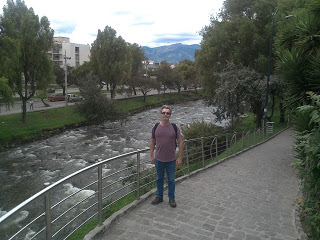 Dan in Cuenca, EcuadorIn general I both liked and was disappointed by Ecuador. That shouldn't be a surprise. That's what happens when you travel, when you start experiencing a place and separating the expectations from te realities. What I'm trying to do now is translate those reactions into understandings. Why did certain things excite and others disappoint? I have superficial answers, but my intention is to dig deeper.
Dan in Cuenca, EcuadorIn general I both liked and was disappointed by Ecuador. That shouldn't be a surprise. That's what happens when you travel, when you start experiencing a place and separating the expectations from te realities. What I'm trying to do now is translate those reactions into understandings. Why did certain things excite and others disappoint? I have superficial answers, but my intention is to dig deeper.
I've come back to a pile of work to do, ghostwriting assignments to complete, miscellaneous business to take care of. It's happening and that is giving me time to consider these important things, to digest the trip.
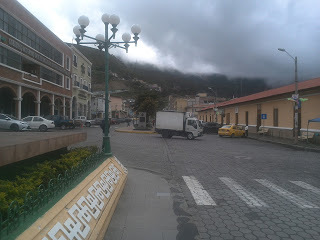 Alausi, Ecuador
Alausi, Ecuador
 Dan in Cuenca, EcuadorIn general I both liked and was disappointed by Ecuador. That shouldn't be a surprise. That's what happens when you travel, when you start experiencing a place and separating the expectations from te realities. What I'm trying to do now is translate those reactions into understandings. Why did certain things excite and others disappoint? I have superficial answers, but my intention is to dig deeper.
Dan in Cuenca, EcuadorIn general I both liked and was disappointed by Ecuador. That shouldn't be a surprise. That's what happens when you travel, when you start experiencing a place and separating the expectations from te realities. What I'm trying to do now is translate those reactions into understandings. Why did certain things excite and others disappoint? I have superficial answers, but my intention is to dig deeper.I've come back to a pile of work to do, ghostwriting assignments to complete, miscellaneous business to take care of. It's happening and that is giving me time to consider these important things, to digest the trip.
 Alausi, Ecuador
Alausi, Ecuador
Published on March 20, 2017 10:25
February 11, 2017
Baby it's warm outside (and buggy)
I'm in a guest house on Simon Bolivar in Guayaquil, Ecuador. It's Saturday evening and the politicos are campaigning in true South American style at the riverfront across the street. A prerecorded and endlessly repeating marching band playing WHEN JOHNNY COMES MARCHING HOME, just drowned a lot of off key political favorites being played by a rock band. Now they've switched to the Marine Corps song. It's about 88 degrees and 75% humidity, which is perfect for political rallies, since both stifle thought and make your brain freeze. It's all pretty loud and in this heat I'm not sure how far I'd get in any attempt to escape.
Published on February 11, 2017 15:06
February 7, 2017
Ecuador
My brother Dan and I are traveling in Ecuador at the moment. He was interested in seeing if it was a place he might like to retire. For my part, I was curious about it. Venezuela was the only country I'd experienced in South America. We've been here just over a week and it's been hectic and fun. I'll write about the places in future posts, but now we need to catch a plane to fly from Loja to Guayaquil. Tomorrow we will take a bus to the coast.
I took the photo in the plaza in Vilcabamba yesterday. It is a lush place.

I took the photo in the plaza in Vilcabamba yesterday. It is a lush place.

Published on February 07, 2017 07:58
January 23, 2017
A Significant Point of View
Everyone has a point of view and so does every story. And the viewpoint is intricately wound into the totality of the story--it is significantly important.I recall a line from a creature called the Churkengoose. This was a story record I had when I was little. He said: “It depends on how you look at things.” There are lots of truths in kids literature and songs and this one is a biggie for writers. A story not only depends on how you look at things, it also depends on who looks at things. We call that the point of view--or POV, seeing as we humans seem to be in love with acronyms.In literature, point of view refers to the narrative mode, the perspective of the narrative voice; the pronoun used in narration.That isn't all that helpful, really, so here is a little elaboration for your consideration.A story can be told in the first (I), second (you), or third (he or she) point of view, for instance, although the second isn’t used that often, except in essays such as this. That gives us who is telling the story, sort of. It describes the perspective we are getting. Detective stories are often told in first person. “I walked into the room and found her body.” That sort of thing. If you want some variety, “He walked into the room and found her body,” can work too, but it’s a different choice and the story flows along a different path.It’s tricky to do well, but unlike those of us walking through real life, a storyteller can change viewpoints, showing different parts of the story from a different perspective. And the viewpoint doesn’t have to be that of a character. The narrator can be someone outside the story, maybe remembering what she was told happened at some point in time or a fly on the wall.I’ve been thinking about these and discussing them with my noveleering friend Bob, who often has multiple viewpoints on things, and we decided it would be fun to categorize some approaches.Most people have heard of the omniscient viewpoint, which simply means the writer can tell you about anything that happens in the world. Limiting the viewpoint to one or two characters means you can only let readers see what those characters see. That means omniscience is handy if the characters don’t get out much. It’s also very useful if you are some sort of deity. After all, what’s the point of knowing everything if you can’t show it to the reader? Unless of course you write in mysterious ways (Deity option #4).
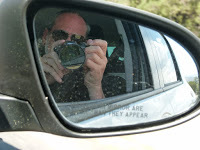 In an attempt to provide insight into something or other, Bob and I have come up with a few variations for our own work. I’ve started a novel that takes place in Cambodia. I’ve chosen to tell the tory in the first person so it includes things the main character thinks he sees, as well as the things he actually sees. (After all, we all see things that aren’t there, right? I hope I’m not the only one.) I’ve been flirting with two concepts here—“first person hallucinogenic” and “first person omnivorous,” which is my favorite, because the character is consumed by what he sees. The term hallucinogenic also has the unfortunate connotation that he’s on drugs, and he isn’t. I think it is lost in our contemporary culture that it is possible to hallucinate without taking drugs, and that’s my preferred course. Not only is it healthier, it’s cheap, like me.Bob is toying with a “first person psychic” viewpoint. This POV lets the writer present what the main character envisions is going on in the heads of other characters. We aren’t sure how useful that will be to storytelling, but it has a lot of interesting potential. It might revolutionize fiction writing, or at least serve as the premise for a lot of stupid science fiction stories.Camus, of course, single-handedly explored the depths of the “depressed first and third person, in fact everyone you meet depressed” POV, just as Kerouac took on the “first person totally lost” POV. Milan Kundera makes effective use of the “rather cynical narrator” POV which is a modernized version of Willie Maugham’s “don’t you wish you were me, narrator” POV. If you are feeling really adventurous, you can follow a strategy that Kundera and some others use—resort to a metafiction POV in which the author makes up a character right in front of you and proceeds to treat them as if they are a “real” character. Armed with these useful insights, as you read various writers, see if you can step outside the conventional POV term and identify what theirs really is. It won’t get you anything but some extra entertainment, but it’s interesting to think about. You might even find out how things look from the writer’s perspective—how he or she looks at things.
In an attempt to provide insight into something or other, Bob and I have come up with a few variations for our own work. I’ve started a novel that takes place in Cambodia. I’ve chosen to tell the tory in the first person so it includes things the main character thinks he sees, as well as the things he actually sees. (After all, we all see things that aren’t there, right? I hope I’m not the only one.) I’ve been flirting with two concepts here—“first person hallucinogenic” and “first person omnivorous,” which is my favorite, because the character is consumed by what he sees. The term hallucinogenic also has the unfortunate connotation that he’s on drugs, and he isn’t. I think it is lost in our contemporary culture that it is possible to hallucinate without taking drugs, and that’s my preferred course. Not only is it healthier, it’s cheap, like me.Bob is toying with a “first person psychic” viewpoint. This POV lets the writer present what the main character envisions is going on in the heads of other characters. We aren’t sure how useful that will be to storytelling, but it has a lot of interesting potential. It might revolutionize fiction writing, or at least serve as the premise for a lot of stupid science fiction stories.Camus, of course, single-handedly explored the depths of the “depressed first and third person, in fact everyone you meet depressed” POV, just as Kerouac took on the “first person totally lost” POV. Milan Kundera makes effective use of the “rather cynical narrator” POV which is a modernized version of Willie Maugham’s “don’t you wish you were me, narrator” POV. If you are feeling really adventurous, you can follow a strategy that Kundera and some others use—resort to a metafiction POV in which the author makes up a character right in front of you and proceeds to treat them as if they are a “real” character. Armed with these useful insights, as you read various writers, see if you can step outside the conventional POV term and identify what theirs really is. It won’t get you anything but some extra entertainment, but it’s interesting to think about. You might even find out how things look from the writer’s perspective—how he or she looks at things.@page { margin: 0.79in } p { margin-bottom: 0.1in; direction: ltr; color: #00000a; line-height: 120%; text-align: left; orphans: 2; widows: 2 } p.western { font-family: "Liberation Serif", serif; font-size: 12pt; so-language: en-US } p.cjk { font-family: "Arial Unicode MS"; font-size: 12pt; so-language: zh-CN } p.ctl { font-family: "Arial Unicode MS"; font-size: 12pt; so-language: hi-IN }
Published on January 23, 2017 14:23

